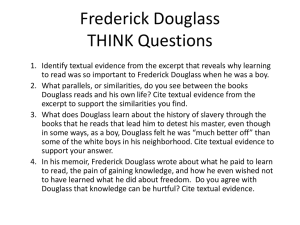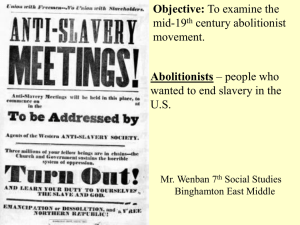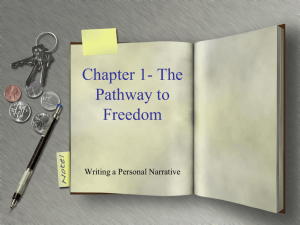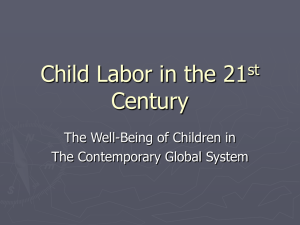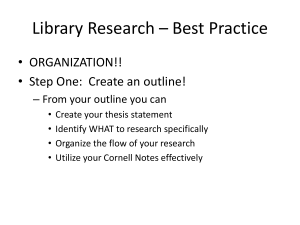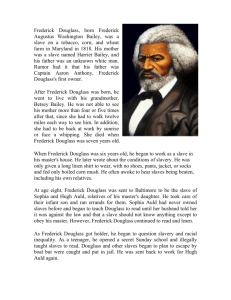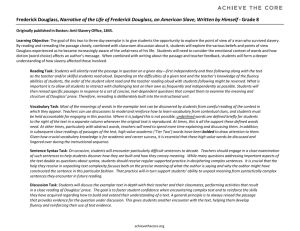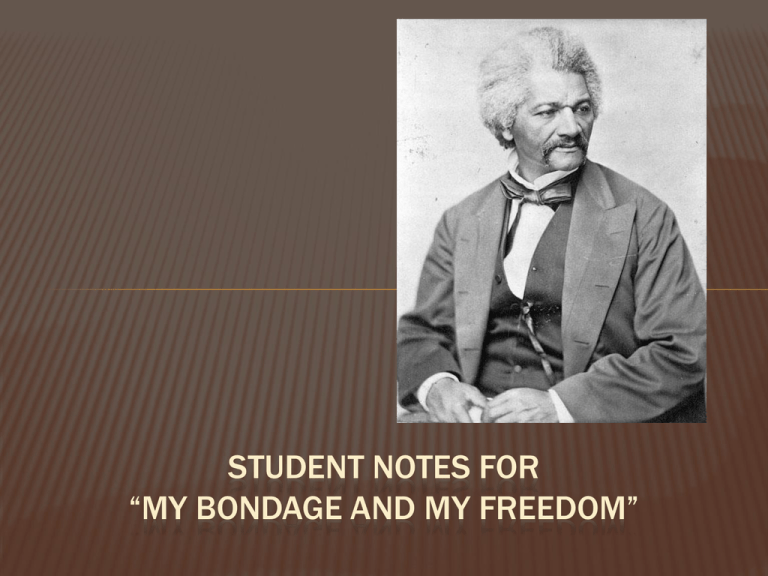
STUDENT NOTES FOR
“MY BONDAGE AND MY FREEDOM”
HIS LIFE IN BALTIMORE
“I lived in the family of Master
Hugh, at Baltimore, seven
years…” (330).
“The most interesting feature of
my history here, was my
learning to read and write…”
(330).
QUESTION 1
What does Douglass like most
About Baltimore life in My Bondage
and My Freedom?
NATURE IN OPPOSITION TO SLAVERY
“Nature has done almost nothing to prepare men
and women to be either slaves or slaveholders”
(330).
As such, “nature had made us friends; slavery
made us enemies” (334).
How does the reader know that “nature had
made [them] friends”? Where is this evident in
the text?
HIS VIEW OF SLAVERY
“On entering upon the career of a slaveholding
mistress, Mrs. Auld was singularly deficient;
nature, which fits nobody for such an office, had
done less for her than any lady I had known”
(330).
“It was no easy matter to induce her to think and
to feel that the curly-headed boy, who stood by
her side, and even leaned on her lap, sustained
to her only the relation of a chattel” (330).
SLAVERY DESTROYS HUMAN RELATIONSHIPS
In looking at his relationship with his
master’s wife, Douglass states, “She
had changed, and I had changed, too.”
We were both victims to the same
overshadowing evil—she, as mistress, I,
as slave” (334).
WHAT CHANGED?
1.
How did Mrs. Auld treat
Frederick Douglass in the
beginning?
1.
What caused her to change?
WHAT CHANGED?
The social practice of slavery had intruded on nature.
Douglass writes, “My mistress had begun to
teach me – was suddenly checked in her
benevolent (kind, compassionate, generous)
design, by the strong advice of her husband”
(330).
“In faithful compliance with this advice, the
good lady had not only ceased to instruct me,
herself, but had set her face as a flint against
my learning to read by any means” (330).
QUESTION 2
Based on the description Frederick
Douglass provides us of the
slave/slave owner relationship, what
would you say is his belief of regarding
the practice of slavery?
DOUGLASS BELIEVED
Slavery destroys both the slave and the slave owners.
“We were both victims to the same overshadowing evil—she, as mistress, I, as
slave” (334).
Slavery makes enemies out of people who should be friends.
Of his mistress, Frederick writes, “that woman is a Christian, but slavery soon
proved its ability to divest her of these excellent qualities. She became more
violent in her opposition to my learning to read, then was her husband himself.
Upon seeing me seated in some nook or corner, quietly reading a book or
magazine, I have had her rush at me with the utmost fury, and snatch from my
hand such newspaper or book with something of the wrath and consternation
which a traitor might be supposed to feel on being discovered in a plot by some
dangerous spy” (331-332).
QUESTION 3
What made My Bondage and My
Freedom an important work in 1855, a
few years before the Civil War?
What point of view is it written from?
What clues does the text provide that
shows us who is speaking?
POINT OF VIEW
“I lived in the family of Master Hugh, at
Baltimore, seven years, during which
time…” (330).
“Nothing appeared to make my poor
mistress more angry than seeing me,
seated in some nook reading a book”
(331).
“I had now penetrated the secret of all
slavery and oppression…” (333).
POINT OF VIEW
First
person narrative
Autobiographical - is a written account of the
life of a person written by that person.
It was one of the few books written
from a former slave’s viewpoint, which
made it a very important literary work.
QUESTION 4
What common attitudes did My
Bondage and My Freedom challenge?
1.
2.
3.
Consider the time period:
How were slaves viewed by the dominant
White culture?
What was the role of slaves in that society?
How did Frederick Douglass’s written
narrative portray the condition of slaves?
ATTITUDES CHALLENGED
1. Slaves were incapable of reading and writing.
Douglass wrote, “Seized with a determination to learn to read, at
any cost, I hit upon many expedients (methods, devices, ways) to
accomplish the desired end” (332).
2. Slaves were not equal to white people.
In his autobiography, Douglass demonstrates his sharp intellect
and ability to argue effectively. He challenged the notion of
inequality, by debating the issue of slavery “with the white boys”
(332) (This shows that he views himself as equal to them). He asks,
“Have I not as good a right to be free as you have” (332)?
3. Slaves were comfortable with their position in life. “To my
bondage I saw no end. It was a terrible reality, and I shall never be
able to tell how sadly that thought chafed my young spirit” (333).
QUESTION 5
What is Mrs. Auld’s opposition to Douglass
learning to read?
Douglass wrote, “Slavery soon proved its ability to
divest her of those excellent [Christian] qualities, and
her home of its early happiness. Conscience cannot
stand much violence (331).
He also said, “In ceasing to instruct me, she must begin
to justify herself to herself; and once consenting to take
sides in such a debate, she was riveted to her position”
(331).
AN ALTERED STATE OF THINKING
Mrs. Auld’s conscience was destroyed by
slavery.
Douglass wrote, “One needs very little knowledge of
moral philosophy to see where my mistress now
landed. She finally became even more violent in her
opposition to my learning to read, then was her
husband himself (331).
QUESTION 6
How does Frederick Douglass feel about Mrs.
Auld? Does he like or dislike her?
Think of the words he uses to describe her.
USE OF DESCRIPTIVE WORDS
“Mrs Auld – my mistress – was, as I had said, a
most kind and tender-hearted woman, and in
the humanity of her heart, and the simplicity of
her mind, she set out, when I first went to live
with her, to treat me as she supposed one
human being ought to treat another” (330).
QUESTION 7
What does Douglass suggest will happen to the
white boys in the future, when they are older and
dealing with “the cares of life”?
He wrote, “I frequently talked about slavery – very freely
– with the white boys. I never met a boy, while I was in
slavery, who defended the slave system…which have
not been bewildered by the cares of life” (332).
The “cares of life” encompassed ________.
WHEN CHILDREN TURN INTO ADULTS
The little white boys who either helped Frederick
Douglass further his education or entered into
childhood talks with him on the issue slavery
would most _________
Likely accept slavery when they became adults.
Why did Frederick Douglass believe this?
SLAVERY SHATTERS HIS CHILDHOOD
Douglas wrote, “I was no longer the lighthearted, gleesome boy, full of mirth and
play, as when I landed first at Baltimore.
Knowledge had come; light had penetrated
the moral dungeon where I dwelt; and,
behold! There lay the bloody whip, for my
back, and here was the iron chain; and my
good, kind master, he was the author of my
situation” (333-334).
QUESTION 8
What is an important message in My Bondage
and My Freedom?
A.
B.
C.
D.
Slave owners and slaves should be friends.
The wish for freedom can be rooted out of one’s
soul.
Slaves have a generally good life in Baltimore.
A kind owner cannot relieve the injustice of
slavery.
QUESTION 9
At first, Douglass says, his mistress acted in a
benevolent manner. He means that she acted
_____________ toward him.
A.
B.
C.
D.
brutally
indifferently
selfishly
kindly
QUESTION 10
When Mrs. Auld caught Douglass reading, she
would sometimes rush at him in consternation,
or ____________, and grab it from him.
A.
B.
C.
D.
anger
confusion
fear
elation



